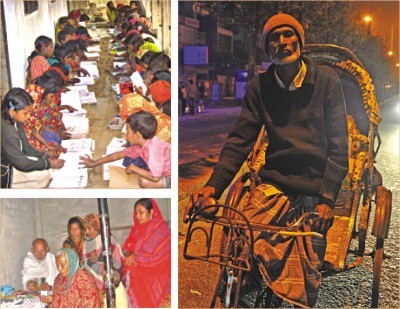Rickshaw Puller Sets An Example In Bangladesh
March 2011

Here is a story from a third world country that would shame many Americans, just as it did me.
Bangladesh is a country, where upper class people scorn the uneducated lower class, who earn their livelihood through menial jobs. Just as in the French language, Bangla has three levels of addresses, one is reserved for the elders and respected, the other for the same status level, and the third for the younger and the people who have no 'respect.' Rickshaw pullers are in this third group, and often it is found that a 20-ish well-dressed kid addressing a 6o-ish rickshaw-puller, in the tone that is reserved for the young and lowly, while the 60-ish person is forced to address the kid with honor and respect. Now from Bangladesh comes a story of a rickshaw-puller, who by his share deed has reached the pinnacle of dignity that few can boast of.
At age 30, Joynal Abedin, watched in desperation as his father suffered and died in Taan Hashadia, a small village in Paranganj union under sadar upazila of Mymensingh. The first hand observation of his dying father's pain gave birth to Joynal's inspiration and resolve that he would not be like other bystanders who have lived in the same village, however, were unable to do anything to help others.
Joynal did not have money or education, regardless, when a person truly desires to do something great, nothing can stop him. With sheer determination, but not much more, Joynal and his wife left the village and moved to the capital city Dhaka. Finding no other meaningful work, Joynal became a rickshaw-puller. For days and night, under rain and sun, in cold and heat, he pulled rickshaws for 14 years while his wife Lal Banu worked at a clinic.
It was not easy living with their small earnings in the capital city where things were expensive, yet, come what may, the family managed to save a few pennies even in their darkest days, and deposited them in two separate bank accounts. In 2001, the couple withdrew their whole savings of nearly $4000 and returned to village. With that money, they purchased 23 decimals of land and constructed a house to live with their two young children. With rest of the savings Joynal and Lal Banu opened a four-bed hospital on his land, and named it after their daughter "Momtaz.” They also established a free coaching center for underprivileged children.
People began coming to Momtaz Hospital from far and beyond, since there was no other free facility in the nearby villages. On an average day, the hospital treats around 25 patients and dispenses various medicines to them. With time, recognition followed, and Joynal was awarded a title Sada-Moner-Manush (Man of a golden heart) in 2008.
Despite honor poring in from different quarters Joynal finds it extremely difficult to run the hospital now. A local paramedic treat patients in the hospital, and a degreed doctor pays occasional visits in exchange of $7 for a day's consultation.
In 2006, he received $430 from the local administration and the social welfare directorate. In 2005, a Bangladeshi woman living in the USA gave him $1000, and he received small helps from various quarters, one among them is from an eminent personality of the country, Abdullah Abu Sayeed. “I shared my dream with my wife and she helped me beyond anyone's expectation in the venture,” said Joynal, “For the last five years I have not received much help from anyone. With the price of medicines spiraling several folds during the time, running the hospital is now at stake. The hospital needs at least $5 a day to function.”
In Joynal's charitable school around 50 children receive free education. He pays two teachers—Md Aiyub and Khalilur Rahman, $100 a month, this is nonetheless becoming hard for Joynal as he is coming of age. For a ricksha puller, 55 is a ripe old age, toil of hard work takes its toll on the person, and Joynal cannot work anymore. His will is strong though, as he says, “I want to cling to my goal till I breathe the last and seek nothing more for me and my family.”
The sad part of Joynal's life is that many took advantage of his simplicity and tried to swindle him with the pretext of helping him. “Many people pledged me of many things while some even invited me for help and I came out of there labeled as a greedy fraud,” he said. Once the people who pledged him help wanted to turn him over to police as a criminal.
The people of his and the neighboring villages nevertheless, adore Joynal. Fazar Ali and Ayub Ali of neighboring Foliamari village said to the national newspaper, The Daily Star, “Momtaz Hospital may appear as nothing to the urban society, but the people here are greatly benefited form it as they have to go several miles for medicine from other places.”
Joynal, you made me feel so small—enamored with my own idiosyncrasies, leading a selfish life in a far away country! But you are the one for whom the birds croon, the seasons bring color, and the gods envy humans; and it is an honor to know that we shared this earth at the same span of time.
Website Designed by Gautam Chaudhary
Except as noted, this work is licensed under a Creative CommonsAttribution-NonCommercial-NoDerivs 3.0 Unported License.



